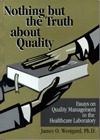Trends
Quality is Job 1 when the rubber meets the road
- Automobile safety
- Patient safety
- What's wrong with this picture?
- What can we learn from this public lesson about quality?
- What can we do?
- References
October 2000
I know the title is a mixed metaphor. It's a mix of Ford's motto "Quality is Job 1" and an expression that questions the relationship between truth and reality, principles vs practice, words vs deeds, etc. In the case of quality, the question is whether our quality assurance programs really assure the quality of our products and services. That's when the rubber meets the road.
Automobile safety
There is a very public lesson on quality unfolding in newspapers and on television today as a result of the Ford/Firestone problem with crashes of sports utility vehicles. It is reported that there have been a hundred traffic deaths in the US from crashes allegedly due to failure of the tires. A gigantic recall of 6.5 million tires is underway. On September 21, 2000, the CEO's of Ford and Firestone appeared again at a congressional hearing to answer questions about what they knew about the problem, when they found out, and what they did or didn't do about it. Automobile safety is important, and evidently there's a lot of political mileage as well!
Patient safety
I can't help but think back to November 1999 report from the Institute of Medicine that medical errors may cause from 44,000 to 98,000 deaths per year in hospitals in the US [http://www.ahrq.gov/qual/errback.htm]. In presenting this information to the public, quality is discussed in terms of "patient safety." The association with safety helps patients understand that medical errors could be hazardous to their health. It also implies that prevention or up front actions need to be taken to reduce consequences later on. This means that resources, including money, need to be invested up front to minimize costs later on. Safety provides a good analogy for quality
One would think that a safety problem of potentially 100,000 deaths/year would have generated a lot more concern than the Ford/Firestone problem of 100 deaths. While there have been congressional hearings, I don't recall that officials of healthcare businesses were summoned to appear and answer questions about their quality systems, what they knew, when they knew it, and what they did about it. But, I have a pretty good idea what they would say if asked!
- CEO of a hospital: We've been inspected and accredited by the Joint Commission for Accreditation of Healthcare Organizations (JCAHO), therefore our quality systems are well documented (meaning there are stacks of paper available to show the inspectors).
- CFO of a pharmaceutical company: All our products have been extensively tested in clinical studies to obtain FDA approval, therefore the quality of our products is well documented (meaning they've demonstrated at least one good effect and disclosed the many possible adverse side effects that are known at the time).
- Director of a clinical laboratory: We've been inspected and found to be in compliance with the Clinical Laboratory Improvement Amendments (CLIA-88), therefore our quality systems are okay (meaning that the laboratory runs at least 2 controls most days and has records to prove it).
- President of a diagnostic company: Our products and product labeling have been reviewed and approved by FDA, therefore there are no quality problems with our systems (meaning that experimental data has been collected, analyzed statistically, and claims for product performance are consistent with the data, rather than demonstrating that product performance satisfies defined quality requirements).
- CEO of a diagnostic supplier: We've been certified to be in compliance with the International Standards Organization (ISO) series 9000 quality standards, therefore our manufacturing processes and systems are documented to be of high quality (meaning they hired a consulting company to help them document their processes, then paid again to have the documentation inspected, and then documented that their documentation was in compliance with the ISO documents).
- Head of a government agency: We've become customer oriented now, have new policies and procedures that are more customer-friendly, and have higher satisfaction ratings from our customers (meaning quality is satisfying customers, particularly those who are politically powerful).
 We invite you to read the rest of this article
We invite you to read the rest of this article
This complete article and many more essays can be found in the Nothing but the Truth about Quality manual, available in our online store. You can also download the Table of Contents and additional chapters here.